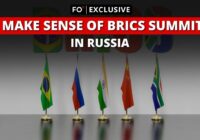When Japan invited the leaders of Brazil, India and Indonesia to attend the G7 summit in Hiroshima, there were glimmers of hope that it might be a forum for these rising economic powers from the Global South to discuss their advocacy for peace in Ukraine with the wealthy Western G7 countries that are militarily allied with Ukraine and have so far remained deaf to pleas for peace.
But it was not to be. Instead, the Global South leaders were forced to sit and listen as their hosts announced their latest plans to tighten sanctions against Russia and further escalate the war by sending US-built F-16 warplanes to Ukraine.
The G7 summit stands in stark contrast to efforts of leaders from around the world who are trying to end the conflict. In the past, the leaders of Turkey, Israel and Italy have stepped up to try to mediate. Their efforts were bearing fruit back in April 2022, but were blocked by the West, particularly the US and UK, which did not want Ukraine to make an independent peace agreement with Russia.
Now that the war has dragged on for over a year with no end in sight, other leaders have stepped forward to try to push both sides to the negotiating table. In an intriguing new development, Denmark, a NATO country, has stepped forward to offer to host peace talks. On May 22, just days after the G-7 meeting, Danish Foreign Minister Lokke Rasmussen said that his country would be ready to host a peace summit in July if Russia and Ukraine agreed to talk.
Many Peace Initiatives
“We need to put some effort into creating a global commitment to organize such a meeting,” said Rasmussen, mentioning that this would require getting support from China, Brazil, India and other nations that have expressed interest in mediating peace talks. Having an EU and NATO member promoting negotiations may well reflect a shift in how Europeans view the path forward in Ukraine.
Also reflecting this shift is a report by Seymour Hersh, citing US intelligence sources, that the leaders of Poland, Czechia, Hungary and the three Baltic states, all NATO members, are talking to Ukrainian President Volodymyr Zelenskyy about the need to end the war and start rebuilding Ukraine so that the five million refugees now living in their countries can start to return home. On May 23, right-wing Hungarian President Viktor Orban said, “Looking at the fact that NATO is not ready to send troops, it’s obvious that there is no victory for poor Ukrainians on the battlefield,” and that the only way to end the conflict was for Washington to negotiate with Russia.
Meanwhile, China’s peace initiative has been progressing, despite US trepidation. Li Hui, China’s special representative for Eurasian affairs and former ambassador to Russia, has met with Russian President Vladimir Putin, Zelenskyy, Ukrainian Foreign Minister Dmytro Kuleba and other European leaders to move the dialogue forward. Given its position as both Russia’s and Ukraine’s top trading partner, China is in a good position to engage with both sides.
Another initiative has come from Brazilian President Lula da Silva, who is creating a “peace club” of countries from around the world to work together to resolve the conflict in Ukraine. He appointed renowned diplomat Celso Amorim as his peace envoy. Amorim was Brazil’s foreign minister from 2003 to 2010, and was named the “world’s best foreign minister” in Foreign Affairs magazine. He also served as Brazil’s defense minister from 2011 to 2014, and is now President Lula’s chief foreign policy advisor. Amorim has already had meetings with Putin in Moscow and Zelenskyy in Kyiv, and was well received by both parties.
On May 16, South African President Cyril Ramaphosa and other African leaders stepped into the fray, reflecting just how seriously this war is affecting the global economy through rising prices for energy and food. Ramaphosa announced a high-level mission by six African presidents, led by President Macky Sall of Senegal. He served, until recently, as Chairman of the African Union and, in that capacity, spoke out forcefully for peace in Ukraine at the UN General Assembly in September 2022.
The other members of the mission are Presidents Nguesso of Congo, Al-Sisi of Egypt, Musevini of Uganda and Hichilema of Zambia. The African leaders are calling for a ceasefire in Ukraine, to be followed by serious negotiations to arrive at “a framework for lasting peace.” UN Secretary-General Guterres has been briefed on their plans and has “welcomed the initiative.”
Pope Francis and the Vatican are also seeking to mediate the conflict. “Let us not get used to conflict and violence. Let us not get used to war,” the Pope preached. The Vatican has already helped facilitate successful prisoner exchanges between Russia and Ukraine, and Ukraine has asked for the Pope’s help in reuniting families that have been separated by the conflict. A sign of the Pope’s commitment is his appointment of veteran negotiator Cardinal Matteo Zuppi as his peace envoy. Zuppi was instrumental in mediating talks that ended civil wars in Guatemala and Mozambique.
Will any of these initiatives bear fruit? The possibility of getting Russia and Ukraine to talk depends on many factors, including their perceptions of potential gains from continued combat, their ability to maintain adequate supplies of weapons, and the growth of internal opposition. But it also depends on international pressure, and that is why these outside efforts are so critical and why US and NATO countries’ opposition to talks must somehow be reversed.
The US rejection or dismissal of peace initiatives illustrates the disconnect between two diametrically opposed approaches to resolving international disputes: diplomacy vs. war. It also illustrates the disconnect between rising public sentiment against the war and the determination of US policymakers to prolong it, including most Democrats and Republicans.
Give Peace a Chance
A growing grassroots movement in the US is working to change that:
- In May, foreign policy experts and grassroots activists put out paid advertisements in The New York Times and The Hill to urge the US government to be a force for peace. The Hill ad was endorsed by 100 organizations around the country, and community leaders organized in dozens of congressional districts to deliver the ad to their representatives.
- Faith-based leaders, over 1,000 of whom signed a letter to President Biden in December calling for a Christmas Truce, are showing their support for the Vatican’s peace initiative.
- The US Conference of Mayors, an organization that represents about 1,400 cities throughout the country, unanimously adopted a resolution calling on the President and Congress to “maximize diplomatic efforts to end the war as soon as possible by working with Ukraine and Russia to reach an immediate ceasefire and negotiate with mutual concessions in conformity with the United Nations Charter, knowing that the risks of wider war grow the longer the war continues.”
- Key US environmental leaders have recognized how disastrous this war is for the environment, including the possibility of a catastrophic nuclear war or an explosion in a nuclear power plant, and have sent a letter to President Biden and Congress urging a negotiated settlement.
- On June 10-11, US activists will join peacemakers from all over the world in Vienna, Austria, for an International Summit for Peace in Ukraine.
- Some of the contenders running for president, on both the Democratic and Republican tickets, support a negotiated peace in Ukraine, including Robert F. Kennedy and Donald Trump.
The initial decision of the United States and NATO member countries to try to help Ukraine resist the Russian invasion had broad public support. However, blocking promising peace negotiations and deliberately choosing to prolong the war as a chance to “press” and “weaken” Russia changed the nature of the war and the US role in it, making Western leaders active parties to a war in which they will not even put their own forces on the line.
Must our leaders wait until a murderous war of attrition has killed an entire generation of Ukrainians, and left Ukraine in a weaker negotiating position than it was in April 2022, before they respond to the international call for a return to the negotiating table?
Or must our leaders take us to the brink of World War III, with all our lives on the line in an all-out nuclear war, before they will permit a ceasefire and a negotiated peace?
Rather than sleepwalking into World War III or silently watching this senseless loss of lives, we are building a global grassroots movement to support initiatives by leaders from around the world that will help to quickly end this war and usher in a stable and lasting peace. Join us.
The views expressed in this article are the author’s own and do not necessarily reflect Fair Observer’s editorial policy.
Support Fair Observer
We rely on your support for our independence, diversity and quality.
For more than 10 years, Fair Observer has been free, fair and independent. No billionaire owns us, no advertisers control us. We are a reader-supported nonprofit. Unlike many other publications, we keep our content free for readers regardless of where they live or whether they can afford to pay. We have no paywalls and no ads.
In the post-truth era of fake news, echo chambers and filter bubbles, we publish a plurality of perspectives from around the world. Anyone can publish with us, but everyone goes through a rigorous editorial process. So, you get fact-checked, well-reasoned content instead of noise.
We publish 2,500+ voices from 90+ countries. We also conduct education and training programs
on subjects ranging from digital media and journalism to writing and critical thinking. This
doesn’t come cheap. Servers, editors, trainers and web developers cost
money.
Please consider supporting us on a regular basis as a recurring donor or a
sustaining member.
Will you support FO’s journalism?
We rely on your support for our independence, diversity and quality.







Comment